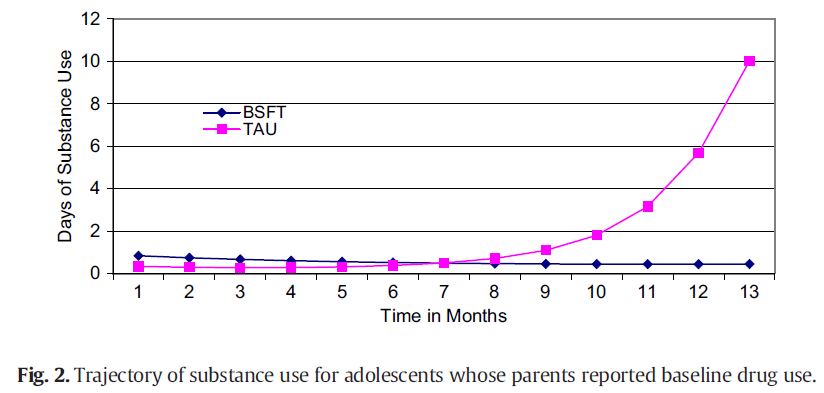Does Family Therapy for Adolescent Substance Users Also Help Parents?
Family therapies such as multisystemic family therapy, multidimensional family therapy, and brief strategic family therapy (BSFT) have been shown to help reduce substance use among adolescents.
Brief strategic family therapy (BSFT) is based conceptually on strategic family therapy (developed by Salvador Minuchin) and structural family therapy (developed by a group led by Jay Haley and Cloe Madanes). It regards the adolescent with the presenting substance use disorders (SUD) as the “identified patient” within a family system marked by maladaptive boundaries and interactions.
Furthermore, altering the family’s functioning through increased cohesion and decreased conflict is assumed to modify the adolescent’s unhealthy coping behaviors including substance use.
Studies have yet to examine whether parents receiving these evidence-based family therapies also make changes to their own substance use.
This is important for two reasons:
- ongoing parent substance use is a risk factor for substance misuse and relapse among adolescents whose substance use disorder (SUD) is in remission
- reduced parent substance use even at subclinical levels could improve their quality of life, and decrease the overall burden of substance misuse in families and communities.
In this secondary analysis of a randomized controlled trial comparing Brief strategic family therapy (BSFT) to Treatment as Usual (TAU) in eight outpatient addiction treatment programs across the country, Horigian et al. assessed 480 adolescents and their families on adolescent substance use, parent substance use, and family functioning (using the Parenting Practices Questionnaire and the Family Environment Scale). Reporting parents were 85% female, 43 years old on average, and had a variable, albeit very modest family income (25% between $10-19,999, and 18% < $10,000).
At baseline (past 30 days), approximately 40% of parents reported alcohol use, 14% drug use, and 45% neither. Adolescents were 80% male, 15.5 years old on average, and 44% Hispanic, 31% White, and 23% African American. Three-quarters of adolescents met DSM-IV criteria for drug use disorder.
The study found that parents of adolescents receiving Brief strategic family therapy (BSFT) significantly reduced their alcohol, but not drug use relative to treatment as usual (TAU), and that change in family functioning partially mediated (e.g., explained) this effect.

Although Brief strategic family therapy (BSFT) families were not significantly different from treatment as usual (TAU) families on family functioning over time, BSFT families showed what is considered a small clinical improvement (i.e., a small effect size) on family functioning relative to TAU families. Contrary to authors’ hypotheses, changes in parent substance use from baseline to 12-month follow-up were not related to adolescent substance use at 12-months.
IN CONTEXT
Parent substance use is a powerful risk factor for adolescent substance use. The current study showed that among adolescents with drug using parents, Brief strategic family therapy (BSFT) may buffer this risk. In addition, well articulated family therapies targeting adolescents with substance use disorders (SUD) may also simultaneously lead to changes in parents’ alcohol use.
The Internet is a valuable resource for the field of recovery, and it is crucial that interventions are designed to stay relevant given the shift towards an Internet-based society.
This study is important to contextualize in the larger adolescent addiction treatment/recovery literature. In the large multisite Cannabis Youth Treatment Study (N=600), a separate but related family therapy, Multidimensional Family Therapy (MDFT), promoted reductions in adolescent substance use to the same degree as the Adolescent Community Reinforcement Approach (A-CRA) and another treatment that combined motivational enhancement therapy (MET) with cognitive behavioral therapy (CBT), but at a greater cost.
Although MET/CBT does not involve parents directly, A-CRA focuses on improving communication and problem solving between patient and parent(s). The extent to which A-CRA and MET/CBT leads to reductions in parents’ substance use and adolescents’ use when parents are drug users is unclear, and thus important to consider when implementing interventions for adolescents with substance use disorder.
BOTTOM LINE
- For individuals & families seeking recovery: Brief systemic family therapy and other family therapies that focus on boundaries and interactions between family members may help modify substance use of both the adolescent and family members.
- For scientists: The current study was a methodologically sound secondary analysis of an RCT of brief systemic family therapy. Change in family functioning appeared to mediate reductions in parents’ drinking. This is a broad construct, however, and future research might determine what specific components of family functioning accounted for improvements (e.g., improved communication).
- For policy makers: Policies to facilitate parent involvement in adolescent SUD treatment may improve parental substance-related risks as well. However, the relative advantage of family-focused therapies relative to other individually or group-delivered treatments is unclear for the adolescents themselves.
- For treatment professionals and treatment systems: Evidence-based family therapy targeting adolescents with substance use disorders may be a useful intervention to promote changes in parents’ substance use as well as adolescents. This may be a particularly good choice for adolescents whose parents are misusing alcohol and other drugs themselves.
CITATIONS
Horigian, V. E., Feaster, D. J., Brincks, A., Robbins, M. S., Perez, M. A., & Szapocznik, J. (2015). The effects of Brief Strategic Family Therapy (BSFT) on parent substance use and the association between parent and adolescent substance use. Addictive behaviors, 42, 44-50.
Image Source: http://www.coram.org.uk

